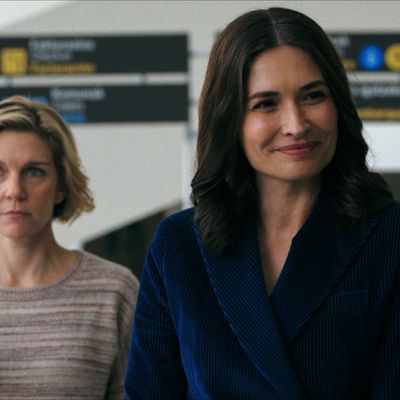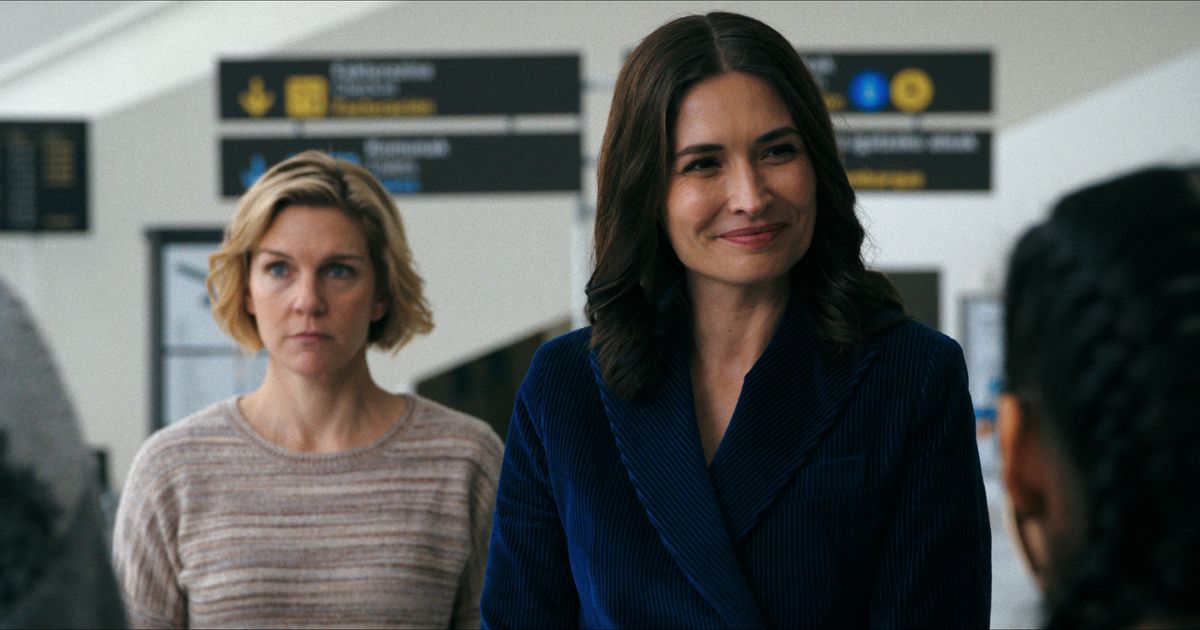
Pirate Lady
Season 1
Episode 2
Editor’s Rating
5 stars
*****
Carol gets an unlikely companion and struggles to connect with her fellow non-conforming humans.
Photo: Apple TV
Despite the Albuquerque setting and Rhea Seehorn’s presence in the lead role, there hasn’t been much obvious crossover between Vince Gilligan’s previous series, the crime drama Better Call Saul, and Pluribus, which perhaps links up more firmly with his past as a writer on The X-Files. But it’s worth noting a couple of places in the thrillingly expansive second episode, “Pirate Lady,” that draw the two shows together.
First, there’s the classic WTF cold open, which may not be as cryptic as the pre-title sequences in Better Call Saul or Breaking Bad, but it introduces us to characters and a scenario that are wholly disconnected from what we’ve seen so far. (Think, say, the “Madrigal” episode of Breaking Bad, which opens with a desultory German CEO dipping chicken tenders into a variety of sauces.) In “Pirate Lady,” an unnamed woman in a burlap robe strides toward an overturned vehicle in a Middle Eastern city, wrenches a charred-up dead body from the driver’s seat, and drags it through an open window. With help from a nearby truck driver, she wraps up the body and drags it uphill to the bus, where we can see other bodies are being collected. From there, she drives a waiting moped to the airport, climbs into the cockpit of a cargo plane, and pilots it to Albuquerque, where minions await with coffee, a hot shower, and a change of identity.
While we can certainly guess who she might be visiting in New Mexico, the open is an opportunity for the show to broaden its scope and suggest the true global scale of this alien operation. It’s one thing to look at the smoking, chaotic city of Albuquerque and imagine scenes like it happening elsewhere, but another thing entirely to see the disquieting sequence where this unnamed being is zipping around dead bodies and burning buildings halfway around the world. And other details count, too, like the importance the aliens have placed on cleaning up the mess they’ve made. They don’t want the earth to be an apocalypse of rotting corpses and smoking wreckage, but something closer to the utopia these seemingly gentle visitors want to promote. Plus, a hierarchy has been introduced around this one character who many others are serving — and who will later emerge as an ambassador of their values.
The second connection is that for as much as Kim Wexler would have in common with Carol Struka, Carol at this moment seems even closer to Everett Acker, the cranky old coot who refused to leave his home in Better Call Saul. On that show, Kim represents a bank that’s seeking to evict the final resident from a piece of property where it intends to build a call center. But Acker won’t leave, and he greets anyone who asks with nasty invective, including Kim, who initially tries to bully him out before deciding that she’s in his corner. Carol is Acker: Unpleasant but righteous and willing to stand on principle. She assumes she’ll get dragged away at some point, but until that happens, no amount of enticement will get her to leave her spot.
“Pluribus” crackles with terrific comic tension as Carol wakes up next to her dead partner, filled with grief yet spoiling for a fight. Her stubborn side comes out in her quixotic effort to dig a grave for Helen in their backyard — we certainly know from past Gillian shows that holes in New Mexico are not easily dug — but she’s devoted, too, and tender in picking out the right quilt in which to lay Helen to rest. The timing isn’t great for an unnamed visitor to stop in with a bottle of water and some advice on how better to penetrate the volcanic rock in her yard. Carol is not impressed to learn that “Jarmell Gurky,” the line supervisor at the Aquafina bottling plant, says the water is okay to drink. She cracks it open and pours it into the ground — very Everett Acker-esque.
Yet Carol does need help, loathe though she might be to get it. And she does actually care deeply about her fellow man, despite the unkind things she’s said in the past about “HoustonMom” and the other dimwits who like her books. After her fury results in the unnamed visitor falling into a spell and shaking — which, she learns, causes every other being to do likewise — news that it results in fatalities worldwide literally sickens her. She is an inadvertent mass murderer, just like the aliens who have taken over her planet. Among the important things she learns in this episode is that she’ll have to control her temper or people will die, which bothers her immensely, even as the beings rush to reassure her. (Maybe because they’ve killed infinitely more people, but we’ll get to that in a bit.)
Though it pointedly takes Carol longer than anyone to ask the name of the important visitor from the opening sequence, we eventually learn it’s Zosia (Karolina Wydra), who looks familiar to her because of her resemblance to Raban, the hunky space pirate of her fantasy series. That Raban was originally written as a woman freaks Carol out, because only she and Helen knew about that, which means that the alien has absorbed all her dead partner’s memories and is now using them to ingratiate herself with Carol. That’s an awful thing to do. But Carol is naturally curious to understand why she’s among 12 people who were not susceptible to “joining” the invaders. Where are the others? Can they meet?
The get-together of English-speaking humans at an airport in Bilbao takes the episode to another level of comedy and philosophy. First, there’s the surreality of Carol huddling up with the first four non-conforming humans — Otgonbayer (Amaraa Sanjid), Xiu Mei (Sharon Gee), Kusimayu (Darinka Arones), and Laxmi (Menik Gooneratne) — as their “joined” family members stand around pleasantly in the background. (“We’re very pleased to meet you, Carol,” they say in unison.) Then there’s the arrival of the fifth, Koumba Diabaté (Samba Schutte), in Air Force One, which the aliens have fetched at his request, along with the phalanx of sexy stewardesses who tend to him. Koumba has picked up on the aliens’ eagerness to please the non-conformists quicker than the rest, and he’s exploiting his power like an amiable Nero.
Once all of them gather for a meeting, the argument against Carol’s skepticism becomes obvious: Why is any of this bad? Joining the aliens seems like a path to eternal contentedness, and, in the meantime, they can have anything they desire, from a tour of the Guggenheim to food service on par with Judgment City in the film Defending Your Life. Carol isn’t having it. She doesn’t like that nearly everyone on earth has been turned into an anesthetized pod person and doesn’t understand why the others can’t see how sinister it is. “It does not matter how nice they are to us or how many supermodels they send to peel our grapes and jerk us off,” she says. “It does not change the fact that this is not right.”
Carol may be correct, but she’s incapable of being diplomatic about it. When Laxmi pushes back against her, Carol is so annoyed by Laxmi treating her adorable son, Ravi, like a real child that she quizzes the boy on the gynecological expertise he now possesses. Ultimately, only the easy-going Koumba continues to speak with her, but it’s Carol’s deepening relationship with Zosia that seems most crucial to the show going forward. The peace-loving utopia that Zosia and the aliens, who we learn are called Celtiberians, are promoting has some ethical holes that Carol is smart enough to expose. Chiefly, if the Celtiberians are so committed to peace that they won’t kill a living thing deliberately, then how can they justify the 886,477,591 humans who have died so far in their mission on Earth? (“I guess you gotta break a few eggs, huh?”, snipes Carol, channeling George C. Scott in Dr. Strangelove.)
The final moments of the episode are more poignant, however, and suggest an important shift in the Carol-Celtiberian divide. Koumba has decided that he likes Zosia and wants her to be his companion, an arrangement that Carol is told requires her blessing. Carol is repulsed by how regressive this sounds and nearly loses her temper for an alien-shaking third time in the episode. “That’s your idea of paradise?,” she asks Zosia. “Being used like some sex doll?” But in the final moments, when Carol is back in her coach seat on the plane, something nags at her. She’s lonely, but she can see as plainly as we can that Zosia is affected by what she’s said. Maybe this is how the revolution starts. Or maybe, like another ending that unfolds on an airport tarmac, this is the beginning of a beautiful friendship.
• Maybe the connection was unintentional, but the sight of humanoid aliens loading humans into trucks and zipping away on two-wheelers calls to mind Jonathan Glazer’s Under the Skin. (Though the Celtiberians are much, much, much gentler to mankind than ScarJo and her kind in that film.)
• A seeming amateur stepping into a cockpit and piloting a decommissioned plane across the sea? Who does Zosia think she is, Nathan Fielder?
• Jarmell Gurky is an A+ funny movie name.
• The power to recall any information or communicate mentally to anyone is, admittedly, extremely cool. Witness that slight pause when Zosia inquires about the five English-speakers being willing to meet with Carol before she says, “All five say yes.”
• “Who’s flying this thing? That gal from TGI Friday’s?”
• Amusing to hear everyone discussing the finer points of the movie Air Force One on the plane: “Actually, if you’ll recall, Harrison Ford never rode in the escape pod, which I thought was a clever gambit. He stayed behind in the cargo hold.”
• Carol’s various descriptions of Ravi to his mother are devastatingly funny: “The one who can perform open-heart surgery and fly the space shuttle,” who is also “your prime minister, some guy you dated in high school, your gynecologist.”
• From the Department of Things Are Not So Bad, Koumba makes the counterargument to Carol: “As we speak, no one is being robbed or murdered. No one is in prison. The color of one’s skin, by all accounts, now meaningless. All zoos are empty. All dogs are off their chains. Peace on Earth.” Then there’s the counter-counterargument from Xiu Mei, who’s annoyed that a freed Beijing giraffe is eating the leaves off her tree.
• Kudos to Carol for resisting the temptation of the pepper bacon she ate in 1998 and the crispy brioche the aliens have flown in for her. I’d personally sell out humanity for the food thing alone. I’m weak.
• An important philosophical exchange to monitor in the future: Zosia telling Carol that her people can’t choose and Carol responding, “Yes, you can. If you can do square roots in your head, you can make choices.” We all make choices. Some of those choices are inevitably hurtful or even destructive. Celtiberians are not immune.
VULTURE NEWSLETTER
Keep up with all the drama of your favorite shows!
Vox Media, LLC Terms and Privacy Notice

